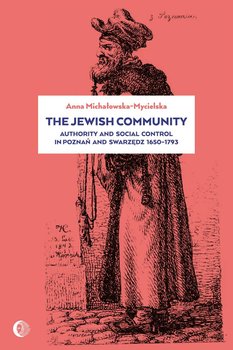
Średnia Ocena:
The Jewish Community: Authority and Social Control in Poznan and Swarzedz 1650-1793
Książka ebook - napisana przede wszystkim na podstawie źródeł żydowskich, przeważnie w języku hebrajskim - stanowi cenny wkład w badania ponad losami Żydów w Polsce. Na przykładzie gmin w Poznaniu i Swarzędzu prezentuje mechanizmy funkcjonowania i politykę władz gminy żydowskiej w epoce nowożytnej w czasie pomiędzy zakończeniem wojen szwedzkich a schyłkiem Rzeczypospolitej. Szczegółowy opis a także analiza struktury władz gminnych, sposobu ich wyłaniania i funkcjonowania pozwala nie tylko zrozumieć, jak gminy funkcjonowały, lecz także jakie przyczyny prowadziły do zmian. This book features the mechanisms underlying the operation of Jewish communities and the policies pursued by community authorities in early modem times. The communities featured are Poznań and Swarzędz. Although authority was mainly exercised in a community by the kahal and its officials, the rabbi, brotherhoods, and craftsmen’s guilds were also involved in the community’s management. The purpose of this work is also to highlight the mutual interdependencies between all of these groups. It is by no means accidental that Wielkopolska (Great Poland) has been chosen as an example. This region, important in demographic and cultural terms, was the area of the earliest Jewish settlement in Polish lands. Jerzy Topolski described Wielkopolska’s unique socioeconomic structure. Agriculture and industry shaped the area’s economy (with the grange catering to the domestic market rather than to exports across the Baltic Sea, with nobility more inclined to invest, with highly developed sheep breeding and textile industry, woolen cloth production in particular, and with a high share of urban population, a positive trade balance, and a high share of pecuniary rent in peasants’ performances to their lords). Wielkopolska was mainly inhabited by medium nobility and there were no large magnate estates, typical of the eastern regions of the Polish-Lithuanian Commonwealth. Owing to Wielkopolska’s specificity, the nature of Jewish settlement in this region was distinctly different from that in other regions: Jews mainly settled in towns,taking up such typical urban occupations as trade and crafts. The book predominantly relies on the archival sources produced by two Jewish communities in Wielkopolska – in Poznań and Swarzędz – which are ample and very well preserved compared to those of other Commonwealth’s communities. It also features broader phenomena characteristic of the way the Jewish self-government functioned at the local level. It is also worth underscoring that the state of estates, where individual estates exercised separate rights and were differently organized, was a very good ground for the growth of such self-government. This second English edition of the book is largely due to the unflagging interest in the history and culture of the Polish Jews. That interest is not a mere fad, but a phenomenon that has become a permanent feature of historical writing. There is also a noticeable trend for scholars, who are increasingly better prepared in terms of research tools and language, to focus on that area of study. Which translates into a new perception of the place and role of the Jews without whom the socio-economic landscape of the ancient Commonwealth would have been highly incomplete and sparse. It is becoming more widespread in Poland, too, as evidenced by the emergence of various museums which feature/underscore the presence of Jews in local communities. As the Museum of the History of Polish Jews, recently opened in Warsaw, best demonstrates. The Poznań community is one of the oldest Jewish communities in the Polish lands. The oldest reference to Jews living in Poznań (Pozna) comes from 1379.[1] Legend has it that a synagogue was built in that town in 1367, first referred to in source materials in 1449. The first mention of the cemetery comes from 1438.Another Poznań legend, which most probably dates from the second half of the 15th century, tells about the host profaned by the Poznań Jews in 1399.
| Szczegóły | |
|---|---|
| Tytuł | The Jewish Community: Authority and Social Control in Poznan and Swarzedz 1650-1793 |
| Autor: | Michałowska-Mycielska Anna |
| Rozszerzenie: | brak |
| Język wydania: | polski |
| Ilość stron: | |
| Wydawnictwo: | Wydawnictwo Akademickie Dialog |
| Rok wydania: | 2015 |
| Tytuł | Data Dodania | Rozmiar |
|---|
The Jewish Community: Authority and Social Control in Poznan and Swarzedz 1650-1793 PDF - podgląd:
Jesteś autorem/wydawcą tej książki i zauważyłeś że ktoś wgrał jej wstęp bez Twojej zgody? Nie życzysz sobie, aby podgląd był dostępny w naszym serwisie? Napisz na adres [email protected] a my odpowiemy na skargę i usuniemy zgłoszony dokument w ciągu 24 godzin.

To twoja książka?
Wgraj kilka pierwszych stron swojego dzieła!Zachęcisz w ten sposób czytelników do zakupu.










